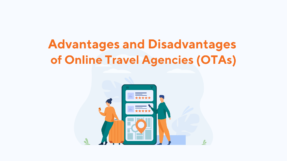Let’s be honest. Embedding sustainability in all your business practices is challenging. All the companies we mention in our guide to sustainable business practices have stumbled at times. In many cases, they enacted the changes that led to their reputations for corporate responsibility because they messed up, or to make up for the damage they do that can’t be prevented.
It’s easy to see why. Imagine you wanted to offer more sustainable transport for your guests, and you had an unlimited budget. It might be tempting to buy a fleet of the most fuel-efficient vehicles available, especially if it means ditching fuel-guzzling beasts. But no matter how efficient they are, new vehicles come with a large environmental cost. So does disposing of your old ones. The difference comes down to a half-dozen factors, all contributing to one big-picture question of which is ultimately more sustainable. That’s a lot to account for. If that big picture is all that really matters, then choosing the right path may take an expert eye on the matter.
That’s why many companies choose to work with external stakeholders to help guide their sustainability efforts and keep them accountable.
B Corps: For-profit companies working for the benefit of others
Becoming a certified B Corporation is one option. B Corps are companies whose sustainability has been certified by the non-profit B Labs — companies who go above and beyond in having a positive environmental impact. The process involves an impact assessment that can take as little as 2-3 hours for small businesses, some legal requirements, and certification fees that scale based on annual sales. Many companies who have gone through the trouble swear by it, like Richard Stammer, CEO of Cabot Creamer Cooperative, who wrote about the process for Harvard Business Review.
“In 2012, Cabot became a certified B Corp. To my surprise, certification not only addressed the questions posed by our retail partners but also delivered value beyond our expectations. B Corp certification encouraged more “whole-systems thinking” around our social and environmental practices, which led Cabot to develop even more robust customer and consumer programs, cut operating costs, and strengthen our brand reputation as a sustainability-minded company.”
B Lab agrees, pointing to case studies that show that their benchmarks, standards and tools help companies recruit, earn press coverage and public trust, and gain competitive advantages. If you don’t think your company is ready to become a B Corp, it may still be worthwhile to complete the impact assessment, which can point out areas that need improvement. According to B Labs, over 15,000 businesses around the world use the B Impact Assessment to benchmark their performance, while only about 2,200 are certified B Corps.
On the other hand, if you’re part of an American company that wants to go further, you can also look into becoming a Benefit Corporation.
Travelife: Sustainability benchmarks and certification for the travel industry
Tour operators, travel agents, and accommodation providers have another option: Travelife. It’s a certification program specifically designed for the travel industry. Like B Corp, it offers assessments, certification, and public recognition. Its standards and criteria are based on leading global sustainability and employment standards, focusing on issues like energy efficiency, labour practices, fair business practices, animal welfare and more.
Every year, Travelife works with ABTA on the Make Holidays Greener campaign, encouraging travel businesses to help their guests choose and achieve sustainable holiday pledges, like offsetting carbon, using local transport, or avoiding plastic.
UNWTO: Sustainable development goals for everyone
The United Nations World Tourism Organization (UNWTO) is also pressing travel and tourism providers to invest in sustainable tourism and encourage their guests to do the same. They declared this year the International Year of Sustainable Tourism for Development.
Travel Weekly looked at the initiative and spoke with several companies who’ve embraced it.
The UNWTO is working to inspire a sea change in the travel industry, a message that appears to be resonating with some travel companies that have responded by committing to changing the way they do business.
“We’ve definitely, over the last 20 months, shifted our business mindset from short-term financial results to a much longer-term perspective focused on people and the planet,” said James Thornton, the newly tapped CEO of global tour operator Intrepid Group. “But to really make a material difference we require scale, which means we will need to grow. So I honestly believe that the growth and purpose are really indelibly linked. Those two goals of growth and purpose beyond profit over the last 20 months have definitely shown us that having a purpose beyond profit can actually be pretty profitable.”
The UN’s Global Goals for Sustainable Development provide businesses and individuals everywhere with 17 specific areas to focus on when building sustainability programs. Your business isn’t likely to be able to address them all, but by choosing one, or a few, to focus on, you can make a tangible difference in your community and for the world.
Opportunities are everywhere
These are just a few of the many groups dedicated to helping companies make the world a better place. For more, you can look to this list of 25 green business certifications that might be appropriate. Or you can contact a member of the growing sustainability consulting industry.
If you need guidance for how to better align your company to sustainable values, help is everywhere. All you need is the desire and vision to begin.

Search The Blog
Categories
Most Popular Articles
- Set-jetting, Forest Bathing, and Hush Trips: 20 Innovative Tourism Business Ideas and Trends for 2023
- Get More Bookings With These 9 Tourism Website Essentials
- Advantages and Disadvantages of Online Travel Agencies (OTAs)
- Your Marketing Mix: the 7 Ps of Travel and Tourism Marketing
- How to Create a Business Plan for Your Tour or Travel Company






